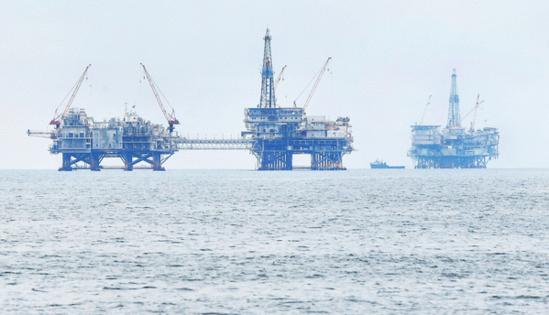Biden to ban new oil drilling over vast stretch of US Atlantic, Pacific waters
Published in News & Features
WASHINGTON — President Joe Biden is set to order a ban on new offshore oil and gas development across some 625 million acres of U.S. coastal territory, ruling out the sale of drilling rights in Atlantic and Pacific waters as well as the eastern Gulf of Mexico.
The move is a sweeping effort to permanently protect coastal waters — and communities that depend on them — from fossil fuel development and the risk of oil spills. At the same time, Biden is keeping the door open for new oil and natural gas leasing in the central and western portions of the Gulf of Mexico that provide about 14% of U.S. output, said people familiar with the matter who asked not to be named because the decision is not yet public.
Biden’s decision, set to be announced on Monday, will further burnish his climate credentials, deepening his record fostering conservation and zero-emission energy. It builds on a series of last-minute White House moves to safeguard lands and enshrine environmental protections before President-elect Donald Trump takes office.
White House spokespeople didn’t respond to requests for comment.
Unlike other steps Biden has taken to constrain fossil fuel development and the greenhouse gas emissions that drive climate change, this one could have long-lived durability, complicating Trump’s intentions to bolster domestic oil and gas production.
That’s because Biden’s planned proclamation is rooted in a 72-year-old provision of federal law that gives presidents broad discretion to withdraw U.S. waters from oil leasing without explicitly authorizing revocations.
Presidents of both parties — including Trump — have invoked the same statute to protect coral reefs, walrus feeding grounds and other American waters from Florida to Alaska. And while presidents have modified decisions by predecessors to exempt areas from oil leasing, courts have never validated a complete reversal.
Congressional Democrats and environmental groups had lobbied Biden to maximize permanent protections against offshore drilling to safeguard vulnerable coastal communities, protect marine ecosystems from oil spills and fight climate change. Some environmental activists were divided on the best approach, worried that a too-broad declaration could jeopardize a legal tool that’s been used to conserve special marine areas since 1953.
Yet the planned proclamation is simultaneously muscular and strategic — indefinitely protecting some areas that Republican and Democratic politicians have jointly pushed to keep free from drilling without encroaching on long-active territory in the Gulf of Mexico that’s a foundation of U.S. oil and gas production.
The declaration would not affect drilling and other activity on existing leases. It also keeps a path open for Republican lawmakers to order more central and western Gulf oil lease sales as a way to raise revenue that could offset the cost of extending tax cuts.
Still, Biden’s move would wall off parts of the eastern Gulf and southern Pacific where the first U.S. offshore oil well was drilled in 1896 and where platforms still produce crude today, even though the last lease sale was in 1984.
Oil companies have shown less appetite for exploring along the U.S. East Coast, where they would confront uncertainty, limited infrastructure and steep opposition from nearby communities. Although roughly four dozen wells were drilled off the east coast in the 1970s and 1980s, the area’s last sale of leases was in 1983, and oil has never been produced from the region.
Environmentalists said Biden’s planned move aligns with growing public interest in limiting offshore oil drilling. Ben Jealous, executive director of the Sierra Club, stressed “there will never be a safe way to desecrate our waters,” but in using “the same authority used by his three immediate predecessors, President Biden is acting to safeguard the public health of coastal communities from the dangers of offshore drilling.”
Trump’s transition team panned the plan. Spokeswoman Karoline Leavitt calling it “a disgraceful decision designed to exact political revenge on the American people who gave President Trump a mandate to increase drilling and lower gas prices.”
“Joe Biden clearly wants high gas prices to be his legacy,” she said in an emailed statement. “Rest assured, Joe Biden will fail, and we will drill, baby, drill.”
Trump could order a reversal of Biden’s action, just as he tried to revoke President Barack Obama’s withdrawals during his first term in office. But that attempt was rejected by a federal district court in 2019, and no appeals court has ever ruled on the matter.
Some of the waters Biden is targeting overlap with territory off Florida’s west coast and the southeast U.S. that Trump himself temporarily withdrew from oil and gas leasing during the final weeks of the 2020 presidential campaign. Trump’s withdrawals are otherwise set to expire in 2032.
Oil industry advocates said new restrictions would limit U.S. energy might, coming ahead of an expected surge in electricity demand from data centers, artificial intelligence and manufacturing. Offshore energy development powers a long chain of economic activity that extends far from U.S. coastlines, they argue, and oil and gas extracted in America yields less planet-warming pollution than elsewhere around the world.
©2025 Bloomberg L.P. Visit bloomberg.com. Distributed by Tribune Content Agency, LLC.







Comments